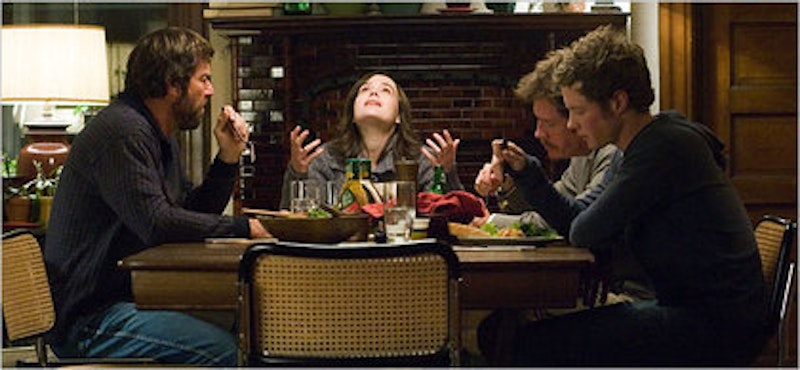Other than those poor souls who derive pleasure from merely sitting in a darkened room and watching familiar celebrity faces float by, I can’t imagine anyone who would enjoy Smart People. Every part of this movie—from the artless direction to the pandering script and half-hearted performances—feels borne out of obligation, the product of a Hollywood system that apparently greenlights projects by way of a checklist. Director? Script? A couple of stars? Enough clichés to fill a sitcom season? Here’s your $7 million.
That’s what it cost to make Smart People—a small amount by filmmaking standards, but let’s not forget that this is an enormous sum of money by any other measure. So rote and uncreative are the characterizations and plot mechanics of this dumb little film that you too may sit in the theater contemplating the justness of a world in which some people get rich making schlock while others die of starvation. That’s right: I hated this movie so much that it made me temporarily angry at the world. Anything to distract myself from the dull, sad march of Smart People’s interminable 95 minutes.
Dennis Quaid plays Lawrence Wetherhold (apparently chosen over “H.W. Poppinjay” or “Barnaby Wixlerpoof” from the Screenwriter’s Dictionary of Possible English Professor Names), a widowed English professor who is such a miserable, pathetic asshole that describing him as such is an insult to miserable, pathetic assholes everywhere. He doesn’t remember his students’ names, his colleagues rightfully hate him for his pomposity, and he habitually double-parks wherever he goes. He also regularly insults both his college-age son and “adopted brother” (Lawrence’s own oft-repeated clarification) Chuck. Oh, and his newest book manuscript—some gobbledygook about epistemology and the history of literary criticism—has been rejected by every publishing house who’s read it. Surely we can all relate.
The mountainous chip on Wetherhold’s shoulder is presumably the result of his wife’s death, but the script is so ham-handed in its depiction of his hatefulness that I challenge any audience member to dredge up sympathy even when he looks longingly at her picture in his office. Lawrence lands in the hospital after trying to jump a fence to get his towed car back, and his injuries are bad enough that E.R. Dr. Janet Hartigan (Sarah Jessica-Parker) reports it to the DMV and he can’t drive for six months. Luckily, Chuck is pressed for cash and he offers to be Lawrence’s chauffer in exchange for a room. Lawrence is violently opposed to the idea for reasons that are never really made clear, as is his shrill hell-bitch of a daughter, Vanessa (Ellen Page), a politically conservative high school senior who won’t allow trivial things like fun or friends to get in the way of her perfect SAT score.
To make a boring story short, Chuck (could there be any other name for the hapless, ne’er-do-well brother/uncle?) teaches Vanessa and Lawrence to ease up and just live, man. This essentially means getting his 17-year-old niece to smoke pot and drink beer while telling his brother that a $50 dinner with Dr. Hartigan will “get you laid.” (“Oh, how ribald!” we’re supposed to exclaim.) Clichés pile up in Smart People so quickly it’s as if the script was written with a drinking game in mind—Hartigan has a gay friend who dispenses relationship advice; Lawrence comes to terms with his wife’s death by finally donating the closetful of her clothes he still keeps; and the “comedy” (let’s be generous) comes primarily from pained gay jokes and gratuitous shots of Chuck’s bare ass while he sleeps. Most offensively, the audience is told yet again (see also: Children of Men, Knocked Up, Eastern Promises) that the sudden appearance of a baby into the script will make any man, no matter how nihilistically self-centered, straighten up and fly right.
That message is noxious and false, but so is everything else about this steaming pile of a film. The action is set in Pittsburgh (Hollywood-speak for Boringsville, USA) merely so the characters can condescendingly refer to it as “the Paris of western Pennsylvania.” Vanessa’s participation in the Young Republicans is given as incontrovertible evidence of her misguided bitchiness, yet we’re told that Chuck’s life—that of a middle-aged man with no job or career prospects, who dresses like a 15 year-old and is rarely seen without a beer—is somehow a noble one because he claims to be happy. So the audience can congratulate themselves for picking up on the superficial allusions to Dickens, mock the uptight Republican shrew, and then go home with the knowledge that dumb people (and babies) can teach us to love.
The vilest thing about Smart People is how godawful everyone involved seems to know it is. Not a single performance stretches beyond mere line reading, and an ongoing barrage of insipid singer-songwriter music plays along to every scene to pick up the emotional slack. The whole offensive debacle is mercifully edited to get each scene over with as quickly as possible, and even so it still feels endless. The movie’s tagline is “Sometimes smart people have the most to learn,” but a movie this joyless and vapid could only serve as a cautionary tale for aspiring filmmakers. You’d think that such a non-lesson would cost less than $7 million.
FILM REVIEW: Smart People
No one involved with this joyless parade of clichés seems to care at all, and why would they?

